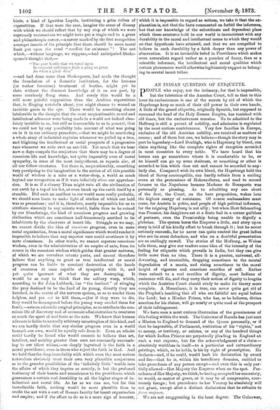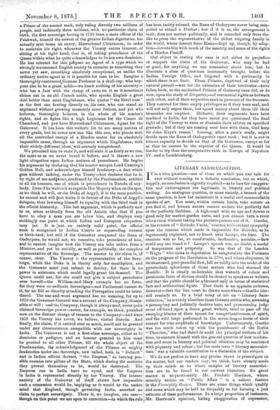AN INDIAN QUESTION OF ETIQUETTE.
PEOPLE who enjoy, not the intimacy, for that is impossible, but the toleration of the Austrian Court, tell us that to this hour its exclusiveness, is one of the secrets by aid of which the Hapsburgs keep so much of their old power in their own hands., A little of the grand etiquette, originally Spanish, but supposed to surround the head of the Holy Roman Empire, has vanished with old times, but the exclusiveness remains. To be admitted to the Hof burg is still a patent of nobility, and admission is regulated by the most curious contrivances. Very few families in Europe; exclusive of the old Austrian nobility, are received as matters of course ; and of them but one, we believe—though the story may in part be legendary—Lord Denbigh, who is Hapsburg by blood, can claim anything like the complete rights of reception accorded in most countries to every noble. We have heard that his horses can go somewhere where it is comfortable to be, or he himself can go up some staircase, or something or other is accorded to him which does not and cannot be accorded to any- body else. Compared with its own blood, the Hapsburgs hold the blood of Savoy contemptible, can hardly refrain from a smiling scorn at the pretensions of Hohenzollerns; and used to accord favours to the Napoleons because Madame de Bonaparte was personally so pleasing. As to admitting any one short of the first, the Court, on the bare proposition, wakes into the highest energy of resistance. Of course ambassadors must come, for Austria is polite, and people of high political influence, for the reigning Hapsburg is not silly ; but when Herr Schmerling was Premier, his daughters sat at a State ball in a corner guiltless of partners, even the Premiership being unable to dignify a plebeian. The system bores the Emperor a little, and story upon story is. told of his kindly effort to break through it ; but he never seriously succeeds, for he never can quite control the great ladies who are its stout defenders, and who on a doubtful presentation are so smilingly unwell. The stories of the Hof burg, as Weisse tells them, may give our readers some idea of the intensity of the feeling for etiquette which prevails in India, but they can give little more than an idea. There it is a passion, universal, all-- devouring, and irresistible, dropping sometimes to the mental degradation of a mania, and rising sometimes to the moral height of vigorous and conscious sacrifice of self. Rather than submit to a real sacrifice of dignity, most Indians of eminence will die, and they carry their notion of dignity to lengths which the Austrian Court should study to make its theory more complete. A Mussulinan, it is true, can never quite get rid of the Prophet's teaching that all who are faithful are equal before the Lord ; but a Elindoo Prince, who has, as he believes, divine sanction for his claims, will go nearly or quite mad at the prospect of their infringement.
We have seen a most curious illustration of the genuineness of this feeling within the week. The Guicowar of Baroda has just sent a Mission to England to demand of the Queen personally, or if that be impossible, of Parliament, restitution of his "rights," not to money, or territory, or salutes, or any of the hundred things for which Indian Princes are perpetually pleading in England at such a vast expense, but for the acknowledgment of a claim— absolutely worthless in itself—to a particular and extraordinary privilege, which, as he holds, is his by right of prescription. He declares—and, if he could, would back his declaration by sword and fire—that he is, within his hereditary domains, entitled to take precedence of any person except—aud even this is only par- tially allowed—Her Majesty the Empress when on the spot. Pre- cedence of Her Majesty, we think, behaving accepted her suzerainty, he would, as matter of grace, or it may be of compromise, cour- teously forego ; but precedence to her Viceroy he absolutely will not grant, except after a distinct declaration that he submits to force majeure.
, We are not exaggerating in the least degree. The Guicowar,
a Prince of the second rank, only ruling directly two millions of people, and indirectly three millions, with no particular claim of birth, the first sovereign having in 1730 been a mere officer of the Peishwah, himself the newest of the greater Indian dignitaries, has actually sent home an envoy, Hurrochund Chintamon, in order to maintain his right, whenever the Viceroy enters Gnzerat, of sitting at his right hand, that is, of taking precedence of the Queen within what he quite acknowledges to be her own dominion. He has selected for this puirpose an Agent of a type which we strongly recommend English society to examine as something they never yet saw, something absolutely exceptional, as unlike the ordinary native agent as it is possible for man to be. Imagine a thoroughly-inetructed.German Professor in a skull-cap, who hap- pens also to be a great noble—we know nothing of his ancestry— who has a face with the stamp of caste on it as it sometimes shines out in an old French noble, who speaks English a great deal better than most Englishmen, who quotes "the Errol case" as the first one bearing directly on his own, who can stand an argument without growing momently more furious, and yet who believes, thoroughly believes, in the whole of his master's rights, and so fights like a high Legitimist for the Comte de Chambord, and you have Hurrochund Chintamon, Agent for the Guicowar. It has been this writer's lot to see many natives of every grade, but he never saw- one like this one, who pleads with all the controlled energy of a Hindoo orator for an absolutely impossible cause, through an argument which Englishmen, with their widely-different_ideas,will scarcely comprehend.
We promised him to state it, and will state it as fairly as we can, the more so as we never heard it before, and it throws a new light altogether upon Indian notions of precedence. He begins his argument by declaring that his master accepts Lord Canning's Golden Bull, and acknowledges himself feudatory—a fact which goes without talking, under the Treaty—but declares that he is, by right of use and wont, confirmed by the Proclamation, entitled to all his honours, one of which is precedence in Baroda of any- body. Even if he waives it as regards Her Majesty when on the spot, afwe think he will, or the Duke of Argyll, if in the same position, he cannot and will plot waive it in favour of the Duke of Argyll's delegate, thus lowering himself to equality with the third rank in the official hierarchy. This last argument, which is perfectly new to us, arises evidently from the old Asiatic idea that if you have to obey a man you are below him, and displays very strikingly one point at which Indian and European etiquettes may jar. It is :not an entirely valid point, for official rank is recognised in Indian Courts as superseding natural or birth-rank, but still if the Guicowar conquered the Rana of Oodeypore, he would not, we conceive, take precedence of him, and he cannot imagine how the Viceroy can take orders from a Minister, and yet be socially, as well as politically, the complete representative of the Sovereign. The answer to the claim is, of course, clear. The Viceroy is the representative of the Sove- reign, while the Duke is in theory only her mouthpiece, and the Guicowar must just submit to destiny, for there is no power in existence which could legally grant his demand. The Queen could not, for she could not give a subject precedence over herself—the William-and-Mary example has no force, for they were co-ordinate Sovereigns—and Parliament cannot do it, for no Bill so directly attacking the Prerogative could be intro- duced. The use-and-wont argument has no meaning, for up to 1859 the Governor-General was a servant of the Company, dismis- sible at will ; and the Company, though it always used, never quite claimed Sovereign power—never, for example, we think, punished men on the distinct charge of treason to the Company—and since 1859 the Viceroy has never, we believe, visited Baroda. And finally, the claim, if it existed ever so much, could not be granted under any circumstances compatible with our sovereignty in India. The Guicowar is not a first-class sovereign, either as to dominion or pedigree, and an honour granted to him must be granted to all other Princes, till the whole object of the Proclamation, the acknowledgment of the Princes as mighty feudatories under one Sovereign, now called, both in " Debrett " and in Indian official decrees, "the Empress," so turning pos- sible enemies into pillars of the State, which during the mutinies they proved themselves to be, would be destroyed. The Empress can in India have no equal, and the Empress in India is represented directly by her Viceroy. The intense anxiety of the Guicowar of itself shows how impossible such a concession would be, implying as it would to the native mind thatrfa ngland, though governing India, asserted no claim to perfeet sovereignty. There is, we imagine, one case— though on this point we are open to correction—in which the rule
has been tacitly relaxed, the Rana of Oodeypore never being com- pelled to attend a Darbar ; but if it is so, the arrangement is tacit, does not matter politically, and is conceded only from dis- like to press the representative of the oldest reigning family in the world, whose descent from Rains—kept up, though, by adop- tion—invests him with much of the sanctity and some of the rights of a Hindoo Pontiff.
Our object in stating the case is not either to prejudice or support the claim of the Guicowar, who may be bad or good, for anything we can remember about him, but to illustrate a class of questions incessantly brought before the Indian Foreign Office, and litigated with a pertinacity to which there is no limit. These Princes, deprived of their only natural pursuit—war for the extension of their territories—have fallen back, as the mediatised Princes of Germany once did, or do now, upon the study of Etiquette,—of ceremonial rights as between each other, and of their respective rank in presence of the Suzerain. They contend for these empty privileges as if they were real, and will not only argue them, but spend money about them till their treasuries are emptied. Hitherto, their arguments have been confined to India, for they have never yet questioned the final right of the Viceroy to raise or diminish their salutes on specified grounds ; but if they are coming over here with them, God keep Sir John Kaye's reason ! Leasing, after a year's study, might decide upon the Rana of Oodeypore's exact rank ; but it is not in human capacity to decide on that of the Guicowar, except so far as that he cannot be the superior of the Queen. It would be harder to try than the comparative rank in Europe of Napoleon IV. and a Leuchtenberg.



































 Previous page
Previous page